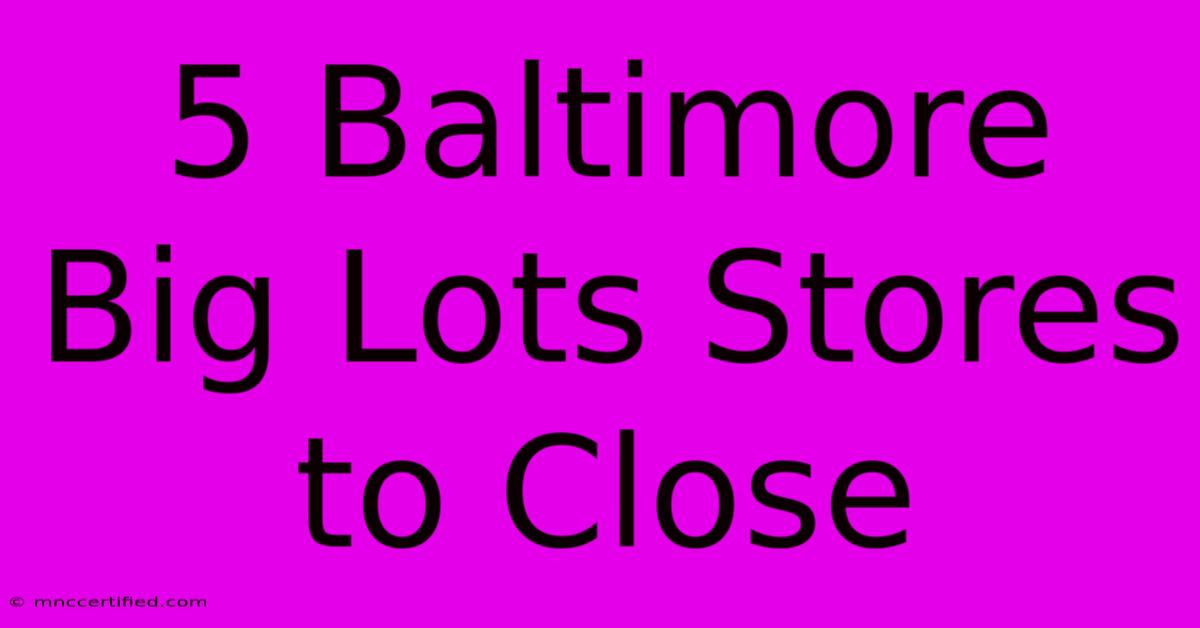5 Baltimore Big Lots Stores To Close

Table of Contents
5 Baltimore Big Lots Stores to Close: What it Means for Shoppers
Big Lots, the discount retailer known for its bargain-hunting deals, has announced the closure of five stores in the Baltimore area. This news has sent ripples through the community, leaving many wondering about the implications for local shoppers and the broader retail landscape. This article will detail the closures, explore potential reasons behind them, and offer advice for shoppers affected by these changes.
Which Baltimore Big Lots Stores Are Closing?
While Big Lots hasn't publicly released a comprehensive list of specific store addresses slated for closure, various news outlets and local sources have reported on at least five locations in the Baltimore metropolitan area that will be shutting their doors. It's crucial to verify the closure of your specific local store by checking the official Big Lots website or contacting the store directly. Rumors and unconfirmed reports should be treated with caution. This lack of transparency from Big Lots emphasizes the importance of directly confirming the closure of your preferred store.
Reasons Behind the Closures: A Deeper Dive
Several factors could contribute to the closure of these Baltimore Big Lots locations. Analyzing these factors provides crucial insight into the challenges facing brick-and-mortar retailers in today's competitive market.
-
Economic Downturn: Economic downturns often lead to reduced consumer spending, impacting businesses reliant on discretionary purchases. Big Lots, as a discount retailer, might be more vulnerable to economic shifts as customers prioritize essential spending.
-
Increased Competition: The retail landscape is fiercely competitive. The rise of e-commerce giants like Amazon and the prevalence of other discount retailers put pressure on Big Lots' market share. This intensified competition may have forced the company to re-evaluate its store portfolio.
-
Lease Agreements: Expiring or unfavorable lease agreements can trigger store closures. High rent costs, especially in prime locations, can make maintaining a profitable operation unsustainable.
-
Changing Consumer Behavior: Consumer shopping habits are evolving rapidly. The convenience of online shopping and the preference for omnichannel experiences challenge traditional brick-and-mortar models. Big Lots might be adapting its strategy to focus on more successful locations or prioritize its online presence.
-
Company Restructuring: Big Lots may be undergoing internal restructuring efforts, streamlining operations to improve profitability and efficiency. This could involve closing underperforming stores to focus resources on stronger locations.
What This Means for Baltimore Shoppers
The closure of these Big Lots stores will undoubtedly impact local shoppers. Many relied on these stores for affordable household goods, groceries, and other items. The loss of these locations may lead to:
-
Reduced Access to Affordable Goods: Shoppers will need to travel further to access similar discounted merchandise.
-
Increased Prices: The reduced competition could potentially lead to higher prices at remaining retailers.
-
Job Losses: The closure will result in job losses for employees at these stores, impacting the local community.
Finding Alternatives: Where to Shop After the Closures
For Baltimore residents affected by the Big Lots closures, several alternatives exist:
-
Other Discount Retailers: Explore other discount stores like Dollar General, Family Dollar, or Walmart for comparable deals.
-
Online Shopping: Utilize online retailers for convenient and often competitive pricing.
-
Local Independent Businesses: Support local businesses offering similar products.
Remember to check for alternative locations of Big Lots stores in your area before seeking other options.
Conclusion: Navigating Retail Change
The closure of five Big Lots stores in Baltimore highlights the ever-changing landscape of retail. Understanding the underlying reasons behind these closures provides valuable insights into broader economic trends and consumer behavior. While these changes create challenges, adaptation and exploration of alternative shopping options can help shoppers navigate this shift. Staying informed about retail news and supporting local businesses are essential elements of a successful shopping strategy in a dynamic market.

Thank you for visiting our website wich cover about 5 Baltimore Big Lots Stores To Close. We hope the information provided has been useful to you. Feel free to contact us if you have any questions or need further assistance. See you next time and dont miss to bookmark.
Featured Posts
-
Trail Blazers Beat Nuggets 126 124
Dec 20, 2024
-
Superman Aftermath Worlds Response
Dec 20, 2024
-
Siddiq Gets Starmers Backing On Bangladesh Issue
Dec 20, 2024
-
Cavutos Fox News Departure Announced
Dec 20, 2024
-
Bristol Gale Warning 70mph Winds
Dec 20, 2024